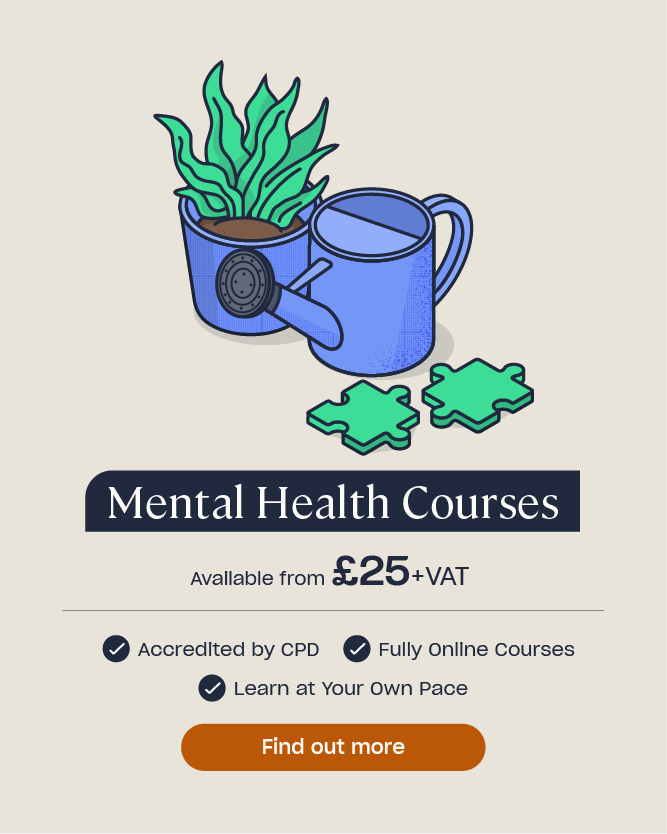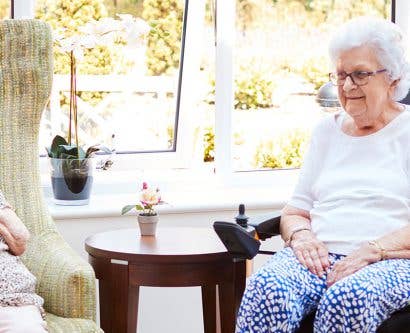How to Promote Positive Mental Health for Healthcare Workers
For those that work in health and social care, even with an immense passion for the work and a high-level of job satisfaction, the daily challenges and the types of situations healthcare workers are exposed to can take a toll on their stress levels, and consequently their mental wellbeing.
This article will focus on the most likely causes of stress and the impact of traumatic and highly-emotive events in the workplace. We will offer guidance on how to help those suffering and highlight the importance of good mental health for all healthcare workers.
What are the Causes of Stress in Healthcare Workers?
The health and social care sector can be fast-paced, emotionally charged, stressful, and under-resourced. Consequently, staff often experience burn out. The term ‘burn-out’ is often used when it comes to describing long-term stress in the workplace and is characterised by emotional and physical exhaustion, feelings of being trapped, unmotivated, and demoralised in their working role.
Workforce burnout in the NHS and social care is a well documented issue, and one the House of Commons Health and Social Care Committee issued a 2021-2022 report on. Within this, they state that a 2019 NHS staff survey, found that 40.3% of the respondents reported that experiencing work-related stress caused them to feel unwell in the previous 12 months.
Whilst each working role will bring with it different challenges, doctors, nurses, healthcare assistants, and ward administrators alike, are all susceptible to increased stress caused by the nature of working in a healthcare environment. They will each feel the pressures of being in high-demand and under-resourced, of anxious and grieving relatives, and of witnessing the struggles of the patients in their care.
Some of the most common causes of stress in healthcare workers include:
- Understaffing.
- A lack of resources.
- Challenging patients and relatives.
- A lack of sufficient training or skills.
- Shift patterns.
- Heavy workloads.
- Long shifts.
- Unsociable hours.
- Poor working relationships.
- Dealing with death.

Understanding how to manage mental health and overcome challenging emotions can be a vital skill for us all, particularly for healthcare workers and caregivers. Whether you are needing to find better ways to manage your own mental health or want to help those around you, understanding how to recognise when there is a problem is often the first step. Taking action and increasing knowledge and awareness of mental health struggles can help to prevent adverse outcomes.
Want to Learn More?
If you would like to build on your knowledge of mental health awareness and improve your communication skills, why not check out our Communication Skills in Health & Social Care Training Course and our How to Talk to Someone Who is Suicidal and Recovering from Caregiver Stress and Burnout articles. You can also increase your understanding of common mental health conditions, including how or when it might suffer, and what you can do about it with our Mental Health Awareness course.
Why is Mental Health Important for Healthcare Workers?
Many things can go hand-in-hand with poor mental health, such as poor quality sleep, a lack of engagement, reduced concentration and focus, and our ability to handle stressful situations. Whether it is long-term stress (burnout), anxiety, depression, vicarious trauma, or PTSD, the impact that mental health has on our physical and emotional functions can be far reaching. Poor mental health can affect all areas of our lives, not just our working abilities; it impacts how we act, think and feel.
When we consider the working life of a healthcare worker, they likely work stretches of long days or nights, have many patients to care for, are under-resourced, and are often faced with unexpected events. To provide high-quality, safe care during such circumstances requires a good level of focus, quick responses, critical thinking and countless empathy, all of which are hard to achieve when experiencing poor mental health.
Taking care of workers’ mental health is vital, to not only limit absenteeism, but to also ensure the staff present are able to work to the best of their ability. Ensuring their actions are safe, that the care they provide is of a high standard, and that the patients and their families benefit from an efficient and engaged workforce is key.
For most health workers, the hours are long and the work is challenging. Many staff have chosen such a vocation because of job satisfaction, their desire to care for those in need, and a want to support patients on their physical and mental health journeys. However, the hours and shift patterns worked often reduce opportunities for workers to engage in the activities and acts of self-care that are needed to fully support their own wellbeing.

Working in an emotionally-charged environment and offering emotional support to others is very difficult when you yourself are emotionally drained. As is being able to take on over 10 hours of challenging work tasks effectively, when you have little energy and focus.
We often hear the phrase ‘you can’t pour from an empty cup’, as a means of explaining the difficulty in being able to give what we lack. This is very fitting for the health and social care sector, where workers are required to give so much.
What are the Effects of Witnessing a Traumatic Event?
We have discussed the prevalence of burnout, how it affects healthcare workers, and how it generally stems from an accumulation of long-term stress. Witnessing a traumatic event, or even several over time, can of course contribute to this. However, sometimes traumatic events can have a different impact, such as in the form of post traumatic stress disorder (PTSD), a type of anxiety disorder that is caused by a distressing, stressful or frightening event.
Common symptoms of PTSD include:
- Nightmares and flashbacks of the event.
- Feelings of isolation.
- A tendency to withdraw.
- Irritability.
- Feelings of guilt.
- Difficulty concentrating.
- Sleep problems, such as insomnia.
How a person reacts at the time and following the event will depend on many factors, and there is no right or wrong way to feel. Depending on the individual’s job role and location, many healthcare workers will expect to witness traumatic events on a regular basis.
It is important to remember that the first time witnessing an event, such as seeing a patient die, seeing relatives grieving, being involved in or witnessing cardiopulmonary resuscitation (CPR), or other life saving interventions, can have a significant impact.
Further instances of witnessed trauma in the workplace may occur, and the consequences of this can result in vicarious trauma. This is often experienced by people who are exposed to other people’s trauma over a prolonged time. It has been described as ‘the cost of caring’ and workers who frequently see patients go through mental and physical ill health, pain, fear, violence, abuse and death are likely to be at risk of suffering from it. Those suffering this kind of trauma often become increasingly invested in thoughts of their patients, even when away from work.

Promoting good mental health in all healthcare workers does not just mean helping someone to manage their burnout, PTSD, vicarious trauma, or any other mental health struggles only once they are in the midst of their battle. It means working in ways that help prevent occurrences from happening, being aware that all staff are susceptible, promoting an open and supportive environment, and recognising triggering events and circumstances.
How to Help Nurses Suffering From PTSD
If you or perhaps a colleague is dealing with PTSD following an event at work, seeking help and support to deal with ongoing emotional and physical feelings is incredibly important. It can take time to process and to heal from any kind of trauma, and no one should have to deal with it alone. Nurses and all those working within the sector are often told they need resilience to manage the challenges their work can bring, but this can be hard to achieve when struggling with issues relating to mental health.
Accessing support systems like counselling, a GP, friends or support groups can help encourage open communication and prevent feelings of isolation. The Royal College of Nursing offers a free counselling service to its members, and Mind has lots of helpful resources regarding trauma and the different ways you can seek help.
Looking after personal health and wellbeing can really help during the process of recovery. This may involve taking regular exercise, eating a healthy diet, keeping to a routine, and practising stress relief techniques such as meditation and mindfulness.
It is also important to be mindful of the environment healthcare workers are exposed to. A worker may continue to work as before, often in the same location, undertaking the same duties, and surrounded by similar circumstances to that of the previous traumatic event. Therefore the working environment may be very triggering for someone who has experienced PTSD.
Ensuring they have a robust support network, the ability to step away when and where appropriate and offering understanding and empathy for what they are going through, are all practical ways to support the worker.

Why Do Nurses Suffer from PTSD
We have mentioned how working in the health and social care sector can go hand-in-hand with stressful situations and environments. Healthcare staff are exposed to this on a daily basis and throughout their working role. It is often because of this that stress and PTSD can initially go unrecognised and unresolved, often being put down as something workers’ should just ‘get on with’ as part of the job. This is an unhelpful mentality, as the longer these issues continue for the greater the impact on the worker and potentially the quality of care they are able to deliver.
Whilst it may be the case that witnessing any distressing event for the first time can have a lasting impact, it is also important to remember that healthcare professionals have reported suffering from PTSD, despite years of experience in their job. An unexpected emergency situation, such as a cardiac arrest, choking, a stroke, or a seizure, can often be quite traumatic to deal with, regardless of whether it is a part of the job role or they have witnessed it before.
The events that cause stress or PTSD can be one in the same, but there are many factors that influence how much of an impact the event has on the worker, and whether the event solely increases stress levels in that moment, or results in a more prolonged struggle with PTSD.
Some causes of PTSD in nursing staff include:
- Dealing with death.
- Traumatic events involving patients well known to the nurse.
- Cases of sexual violence.
- Dealing with heavy bleeding.
- Resuscitating patients.
- Cases of child abuse.
- Being needed in more than one place at a time due to heavy workload and understaffing.
- Verbal and physical abuse from patients and relatives.
- Witnessing grief.
- Having difficult conversations, such as end-of-life discussions.
It is vitally important that all healthcare workers have an awareness of the ways their work can take a toll on their mental health. They should learn to recognise when this is happening, know how to access help and support, and understand the role good mental health plays in all aspects of their working and personal lives. Taking care of themselves will enable them to take better care of others.
Further Resources:
- Stress Awareness in the Workplace Online Training Course
- How to Talk About Mental Health
- How to Build Resilience in Healthcare Professionals
- Champions in Healthcare: Role and Responsibilities
- Guidance on Complaints Procedures in Health and Social Care
- Carers’ Breaks and Respite Care for Caregivers
- Leadership in Nursing: Importance and Leadership Styles
- Mental Health Awareness Training Course











